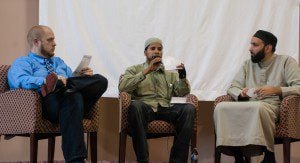Upon hearing the words “Muslim Youth,” my mind automatically drifts to a negative connotation — a connotation in which I see another Muslim brother on my college campus flirting with a group of girls in shorts and miniskirts; a connotation that retraces a Facebook picture of a Muslim girl in a short, red dress seducing the camera with her boyfriend on her tattooed arm. However, after attending the All Dulles Area Muslim Society (ADAMS) #OccupyDeen youth conference in Northern Virginia last weekend, I had a change of heart.
The conference — first of its kind at ADAMS — was designed to bring together Muslim youth from different mosques in the region. But, people came from neighboring states, including Maryland, and some came from as far as New York to attend, totaling about 600 youth and adults who had gathered to gain knowledge and be inspired about issues involving Muslim youth in America. Speakers included local leaders like Shad Imam, Asma Mirza, Joshua Salaam, Sheikh Abdul Rafaa Ouertani and guest speakers Imam Suhaib Webb and Imam Omar Suleiman.
I went to the conference expecting more of a “Muslim youth today are a disappointment” feeling, but was surprised how most of the speakers were optimistic about the state of Muslim youth today.
The first set of speakers — Suleiman, Imam and Sheikh Abdul Rafaa Ouertani — discussed how important Muslim youth are to the ummah (community). To emphasize his point, Suleiman narrated stories from the time of the Prophet Muhammad (pbuh), when youth as young as 13 were the leaders of the community. He spoke of the young Abdullah Ibn Abbas, one of the top narrators of hadith, who only knew the Prophet for three years but was able to extract mounds of knowledge and life lessons from him.
Other leaders at that time included Ja’far ibn Abi Talib, who was only 21 when he gave his famous speech to the King of Abyssinia, and Muadh ibn Jabal, who was 19 when he travelled to Yemen. Suleiman said, noting the examples of the past from the Prophet’s time, “The disaster of the ummah is when youth are not involved.”
But by glancing at the audience, I realized that was not the case in our community today.
I was surrounded by Muslim youth who were active in their community. In fact, the organizers of the conference themselves were young. Still, I couldn’t block the images of corruption from flowing back into my mind. Like a camera roll, my mind flashbacked to a picture of a Muslim friend I knew since elementary school — losing her way and losing her identity. My stomach felt the feeling of betrayal and grief, the feeling when you see your own brother or sister doing something wrong and you have done all you can do to try to get them to stop, but they won’t.
My negative thoughts were interrupted by the announcement of awarding the youth of the month at the ADAMS center. This new program, as the youth coordinator said, rewards a Muslim boy and Muslim girl (from ages 12-21) who work tirelessly to help their community.
At that moment, I realized I had been wrong all along. I was clouding my mind with only the negative thoughts and pessimistic opinions about Muslim youth. As Suleiman said in his speech, “Youth are stepping up to the plate. We should be optimistic.”
During the break, I ran into an old friend I thought I would never see at the mosque ever again. I hadn’t seen this friend in years because she had moved out of her parents’ house and wanted to live by her own rules. Unfortunately, some of the Muslim friends I have seen move out or go away for college have lost parts of their faith and resorted to haram acts like drinking alcohol.
However, when I saw her at the mosque and at the conference, my heart overflowed with happiness, causing me to hug her with a full embrace. She had told me that she was moving back in with her parents and that she wanted to go back to school and finish her education. I regained my hope.
Brothers and Sisters in Islam — yes, your youth are struggling. We are faced with issues of gender relations, drugs and even identity issues. We may lose our way once or twice along the journey, but there is hope. There should always be hope because one day, no matter how far a youth may have gone, they can still reroute to the straight path, as Webb said.
Omama Altaleb is a sophomore at George Mason University. She is studying communications with a concentration in journalism. She is also an intern at the Arab Studies Institute (ASI) in Fairfax, VA. Photo credit: Masouna Kochaji













